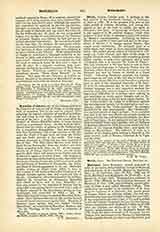

Mayan, PRUDENTIUS, a learned Benedictine of the Maurist Congregation, b. October 14, 1683, at Sezanne, in the Department of Marne; d. April 2, 1762, at Paris. After studying humanities at Paris he became a Benedictine at the abbey of St. Faron near Meaux on January 30, 1703, and continued his studies at the abbey of St. Denis. He was then sent to St. Germain-des-Pres to collaborate with his confrere Touttee in the edition of the works of St. Cyril of Jerusalem. In 1734 he was forced to leave St. Germain-des-Pres at the instance of Cardinal Bissy, who suspected him of keeping his confreres from accepting the Bull “Unigenitus“. After spending a year at the abbey of Orbais, he was sent to St. Martin de Pontoise and in 1737 he was transferred to the abbey of Blancs-Manteaux, where he spent the remainder of his life. His profound knowledge of theology and patristics is attested by the learned and exhaustive introductions which he prefixed to his critical editions of Greek and Latin Fathers as well as by his other literary productions.
His masterpiece is the edition of the works of St. Justin: “Justine philos. et martyris opera quae extant omnia necnon Tatiani, Athenagorae, S. Theophili Hermiae” (Paris, 1742; P.G., IV). He further edited the works of St. Cyril of Jerusalem which had been prepared by Touttee: “S. Cyrilli Hieros. opera” (Paris, 1720; P.G., XXXIII); the works of St. Cyprian which had been begun by St. Baluze: “S. Cypriani opera”, to which he prefixed a basic life of St. Cyprian (Paris, 1726, P.L., IV); the third volume of the works of St. Basil the two first volumes of which had been completed by Garner (Paris, 1730). His other works, all anonymous, are “Dissertation sur les Semiariens” (Paris, 1722); “Divinitas domini nostri Jesu Christi manifesta in scripturis et traditione” (Paris, 1746; new ed., W ürzburg,1859); “La divinite de Jesus Christ prouvee contre les heretiques et les deistes”, 3 vols. (Paris, 1751); “La doctrine de l’ecriture et des peres sur les guerisons miraculeuses” (Paris, 1754); “Les grandeurs de Jesus Christ avec la defense de sa divinite” (Paris, 1756).
MICHAEL OTT

